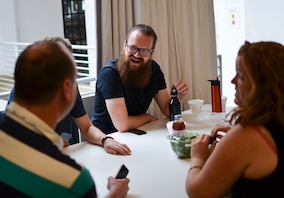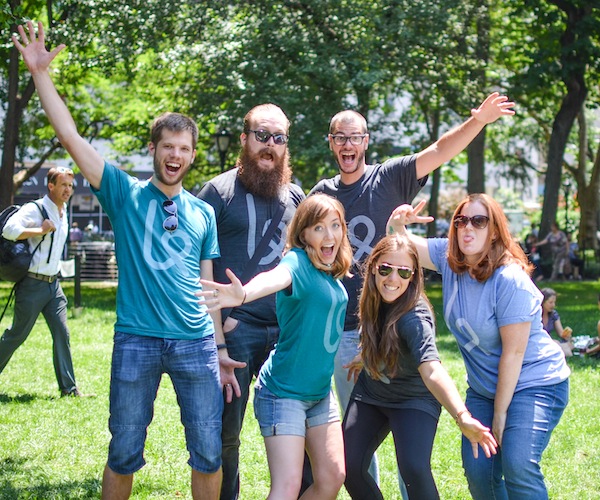Even if transparency is one of your official organizational values, how do you actually make that come true?
Karma has a company culture of openness and sharing, one that reflects its mission to make connecting to the internet easier for everyone. That philosophy of accessibility permeates the company — whether in sharing their journey with their customers, providing weekly — yes, weekly — updates to their investors, or how they get stuff done together.
Company culture isn’t what is written on a poster or slide deck but what happens day-by-day. And what the Karma team has figured out is that transparency doesn’t just happen by itself. The kind of information-sharing it requires depends on people’s willingness to be open with each other, day in and day out — and one of the best ways to do it is tell each other about their day.
The Power of Storytelling At Work
The Karma team seems to intuitively understand how to share with each other, and they do so as a distributed team, with an office in New York and people out in Amsterdam, South Korea, and San Francisco.
What helps them stay connected is by writing asynchronous email updates every day about what they’re up to in iDoneThis. Instead of writing dry, humdrum items that sound like checked-off errands on a to-do list, they approach the updates as an opportunity to share stories of what’s going on and what stood out about the day — including what you got done, funny things that happened, or a customer email that makes or breaks your day.
Paul Miller, a former journalist who recently joined the Karma team, told us how the updates can be like a serialized story. His coworker, Klaas, for example, was trying to get charts to work on Android for the longest time, and every day was a new snippet in the continuing battle. “It was the most entertaining saga,” Paul notes. “The most interesting things are these internal struggles that people have.”
Work Narration Helps People Do Their Job
What the Karma team is doing is narrating their work – describing their experiences and presenting that story to their team. Instead of the painful, artificial process of filling out formal status reports, or having managers monitor their every move, it’s the employees who are the authors, the ones in charge of what they tell and how.
In fact, for Paul, the updates are an opportunity to practice his craft, “As a writer, I’m just always performing when I’m writing. I live for the likes. A like in iDoneThis means more to me than a retweet.”
As Drake Baer writes, narrated work allows people, especially managers, to know what everyone’s up to without spying or nagging them:
Intensely smart management thinker Dion Hinchcliffe calls it narrated work: …[C]reate a palette for people to describe the work they’re doing as they’re doing it, creating a record of all the things that get done, all without eroding the foundation of creativity: autonomy.
And that’s how Karma gets stuff done as a fast-moving, adaptable startup team. CEO Steven van Wel explains, “We give people a lot of freedom to do what they want to do. Everyone has a ton of responsibilities and within Karma, responsibility also means transparency” — including “making sure that everybody else knows what you’re doing.”
The Team that Eats Together
Narrated work allows a glimpse beyond what people are doing into how they’re doing. This transforms what Harvard Business School professor Teresa Amabile calls the “inner work life” (the “constant stream of emotions, perceptions, and motivations as they react to and make sense of the events of the workday”) into common knowledge.
Getting people to share that inner work life and other personal stories doesn’t come naturally. According to Steven, one key to making that possible is their daily family-style team lunches.
In Amsterdam, work lunch is a communal process. People buy groceries, make the food — often sandwiches — set the table, and eat together. When the Karma co-founders first arrived to New York from, they followed what everyone else was doing and ate lunch at their desks. But Steven had to put his foot down at the misery of it all: “No way! I’m behind my desk for eight to ten hours, and I need to get away.”

Now Karma has taken up the Dutch lunch tradition, New-York style. Every day, everyone orders food on Seamless (paid by the company) — and sits down to eat together, family-style. This time isn’t for discussing work at all but everything else, from funny things on the Internet to whatever’s going on people’s lives, like the inevitable Ikea-themed stories that popped up when multiple team-members were moving at the same time.
Getting to know people on a personal level seems like it could be distracting or unprofessional but it actually provides an important foundation of learning how to communicate with each other.
* * * * *
Many co-workers eat lunch together, but for Karma, the ritual is a deliberate part of a larger culture to build both personal relationships and an open way of working.
Narrating work, telling personal stories, and sharing your inner work life are inherently vulnerable acts that can’t happen without a certain level of trust and comfort. Thanks in large part to daily interaction, work narration, and team lunches, Karma team has developed a foundational camaraderie that makes it possible to support, share, and do great work with one another.

